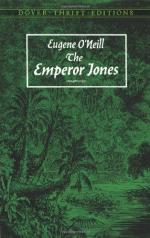|
This section contains 888 words (approx. 3 pages at 400 words per page) |

|
Expressionism
Expressionism is a term used for an artistic movement that initially appeared in painting, as a reaction to Impressionism, near the beginning of the twentieth century. Eventually the term came to be applied to literary forms, including drama, where it served as a reaction against Realism. Expressionism was strongest in drama in the early-1920s.
Basically, Expressionism is an attempt to objectify inner experience, to express the reality of the inner self rather than to copy external reality. Expressionism is most often concerned with representing states of human consciousness and exploring the psychology of complex feelings. Often, the emphasis is on intense and rapidly changing emotional states, since these are considered more interesting than states of serenity and calm. In the late-nineteenth and early-twentieth century, the famous Viennese psychoanalyst Sigmund Freud had revolutionized the conception of humanity by introducing the world to the complexities of the subconscious...
|
This section contains 888 words (approx. 3 pages at 400 words per page) |

|




